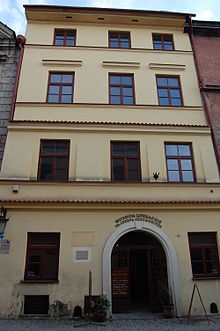
Quick Facts
Biography
Józef Czechowicz (15 March 1903 – 9 September 1939) was an avant-garde Polish poet. Known as a nostalgic, catastrophic author, he was also the leader of the literary avant-garde and bohemians in Lublin. For this visionary poet, verse seemed to be a question of imagination; he would play with word consonances, dreamlike associations, musicality, and create picturesque visions. Czechowicz used to live and create in Lublin; he also died there tragically, a few days after World War II had started.
Life
Józef Czechowicz came from a poor family living in Lublin. He was born in a basement flat, which has not survived to these days, in Kapucyńska 3 Street. His father, Paweł Czechowicz, worked as a janitor and, later, as a meter leader in the Warsaw Bank in Lublin. In 1912, he died due to a severe mental disease. Józef Czechowicz's mother, Małgorzata, née Sułek, was a good-natured person of a tiny posture. 10 years older than her husband, she died in 1936. The poet dedicated to her many of his poems. Apart from Józef, Paweł and Małgorzata had three children, Janek, Katarzyna and Stanisław.
In 1913 Czechowicz went to a Russian primary school in Lublin and graduated from the First Seven-Form City School in 1917. During the Polish-Soviet War, in 1920, he volunteered to join the Polish army but later came back home to continue his education. The poet attended the Teacher’s College, the Higher Teacher’s Course in Lublin and completed his education in 1929, graduating from the Institute of Special Pedagogy in Warsaw.
At first, he worked as a teacher in Brasława, Słobódka and Volodymyr-Volynskyi; he also taught in a special school in Lublin, whose manager he eventually became.
While his first volume of verse, kamień (stone) was printed in 1927, it is considered that he officially made his debut, publishing in the first issue of Reflektor "Opowieść o papierowej koronie" (A Story of a Paper Crown), poetic prose whose protagonist is Henryk, a disappointed homosexual lover and a failed suicide.
Józef Czechowicz was a homosexual. His sexual orientation significantly influenced his writing but it also brought down repression on him.
He also worked as a journalist and an editor of newspapers and magazines based in Lublin. He followed this occupation after he moved to Warsaw in 1933. He belonged to Polish Teachers' Union and supported many of his writing friends, with both finances and publishing. He would take care of a group of poets who used to live at Dobra 9 St: Henryk Domiński, Wacław Mrozowski and Bronisław Ludwik Michalski. While he was living in Warsaw, he developed friendships with poets such as Czesław Miłosz and Anna Świrszczyńska.
Death
As Alina Kowalczykowa indicates, in the poetry volume nuta człowiecza Czechowicz envisioned himself being struck by a bomb. Having heard about the outbreak of World War II, Czechowicz left Warsaw and came back to Lublin. He was convinced that being outside the capital city would make him safe. On 9 September 1939 between 9 and 10 a.m. he was at the barber's at Krakowskie Przedmieście 46 St. He died when the building was bombarded.
Poetry
In his approach to rhyme and metrics, Czechowicz was unorthodox. However, as Czesław Miłosz cogently points out, "all of his poetry is intrisically linked to the so-called 'bourgeois lyricism' of the seventeenth century and to folk songs." He emphasised the striking harmonious musicality in his poetry by using onomatopoeia, phonetic instrumentation, and sonorous neologisms as well as selecting originally harmonious rare assonances and rhymes.
Czechowicz is often described as a poet of the city, of small towns and provinces. The supernatural character of the worlds presented in his poetry is intensified by the use of personifications, including nature and landscape elements. His rejection of capital letters and punctuation also increases the atmosphere of mystery and ambiguity, typical in his works.
Czesław Miłosz notes that the very voice of this poet, hardly audible and murmuring, cannot be compared to any kind of Western poetry, and it appears to be untranslatable due to exploiting the concealed sonorities characteristic only to this one language. Still, some analogies can be suggested: "His lyrics can be likened to chamber music made poignant by the counterpoint of dark philosophical and metaphysical problems."
Józef Czechowicz Literary Museum in Lublin

Józef Czechowicz Literary Museum in Lublin is actually a department of the Lublin Province Museum. The main goal of the museum is to collect and share manuscripts and publications by or about Czechowicz, though not exclusively (other writers from the Lublin region are included).
The museum was inaugurated on 9 September 1968, on the 29th anniversary of Czechowicz's tragic death. Originally, it was situated at Narutowicza 10 St. Since 9 September 2002 the exhibitions of the museum are available for the public in an old tenement in Złota 3 St (in the Old Town).
Published works
Collections of poems
- kamień (1927)
- dzień jak codzień (1930)
- ballada z tamtej strony (1932)
- stare kamienie (1934)
- w błyskawicy (1934)
- nic więcej (1936)
- arkusz poetycki (1938)
- nuta człowiecza (1939)
Plays
- Czasu Jutrzennego
- Jasne Miecze
- Obraz
